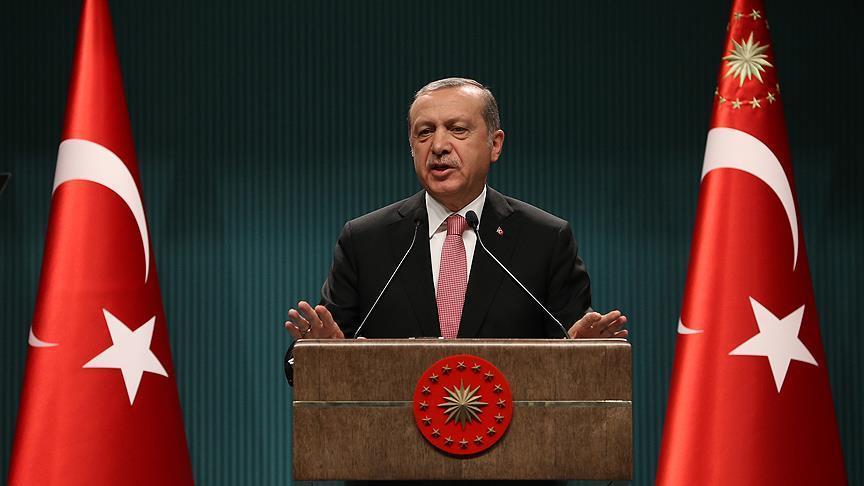Three-month state of emergency declared in Turkey
Turkish President Recep Tayyip Erdogan makes historic announcement after National Security Council, Cabinet meetings
 Turkish President Recep Tayyip Erdogan
Turkish President Recep Tayyip Erdogan
ANKARA
Turkish President Recep Tayyip Erdogan announced Wednesday a nationwide three-month state of emergency after Friday's failed coup that martyred hundreds of people and injured over 1,500 others.
Speaking at presidential complex after back-to-back National Security Council and Cabinet meetings – the first since the coup – Erdogan said the three-month state of emergency was being declared under Article 120 of the Turkish Constitution.
Under Article 120, in the event of serious indications of widespread acts of violence aimed at the destruction of the free democratic order, a state of emergency may be declared in one or more regions or throughout the country for a period not exceeding six months.
"The purpose of the state of emergency is to most effectively and swiftly take steps necessary to eliminate the threat to democracy in our country, the rule of law, and the rights and freedom of our citizens," Erdogan said.
The president said the move aimed at 'eliminating coup-plotter terrorist group' in reference to Fetullah Terrorist Organization, or FETO, which is led by followers of US-based preacher Fetullah Gulen.
Turkey's government has said the attempted coup was organized by Gulen.
At least 246 people, including members of the security forces and civilians, were martyred during the failed putsch, and over 1,500 others were wounded as they protested it.
Gulen is also accused of a long-running campaign to overthrow the state through infiltrating Turkish state institutions, particularly the military, police, and judiciary, forming a “parallel state.”
Speaking words of reassurance to the Turkish people, the president said: "Never be worried. There is nothing to worry about."
He said "it is out of the question" for the armed forces to seize power. "Quite the reverse, the authority and will of the [civilian] leaders will grow more in this process."
"We never compromise on democracy, and we will not compromise," he added.
Erdogan blasted Standard & Poor's downgrade of Turkey's main sovereign rating in the wake of last week’s failed coup as politically motivated.
“Why are you even interested in Turkey? We're not a member of you… Don't every try to mess with us,” he said.
In 2013, S&P failed to reach a rating agreement with the Turkish Treasury, since which it has only issued an unpaid, unsolicited assessment.
The Treasury has deals with other international rating agencies, Fitch and Moody’s, which kept the country’s investment-grade rating in the failed coup’s wake.
The president said that Turkey is still committed to advancing infrastructure projects and will continue its economic reforms.
Erdogan said that S&P’s assessment does not reflect the realities of the Turkish economy, which grew 4.8 percent in the first quarter of 2016 compared to the same period last year. The president vowed that Turkey will maintain fiscal discipline.
“Turkey will continue its economic reforms without any interruption….There is no liquidity problem,” he said.
After declaring the nationwide three-month state of emergency, Erdogan later addressed people assembled in public squares across the country via video conferencing.
Erdogan first addressed crowds in the central Anatolian city of Konya, then connected with the southeastern city of Sanliurfa online from Ankara.
He said the state of emergency is not martial law, adding, “This is a movement to clear terror members from state institutions to process democracy better.”
“The state of emergency law is a process of empowering governors more. The Turkish Armed Forces will serve the governors in provinces, and work with them. There is no any limitation on fundamental rights and freedoms during the state of emergency. We are the guarantors of it," he added.
On his official Twitter social account, Prime Minister Binali Yildirim said: "This [state of emergency] decision is not for the daily life of our people, but rather is for the proper and swift functioning of state mechanisms."
Yildirim also reiterated his call to citizens to not leave the streets.
Deputy Prime Minister Numan Kurtulmus told reporters in Ankara: "The conditions of the state of emergency will only be used for fighting the parallel structure."
Ina ddition, a National Security Council and Cabinet statement said, “Our body has once again confirmed its commitment to democracy, fundamental rights and freedoms, and the rule of law. The steps to be taken afterward were also discussed.”
The statement added that the state of emergency was declared in order to implement measures to protect “citizens' rights and freedoms, our democracy, and the rule of law.
“This state of emergency advisory jurisdiction is only for the purpose of eliminating threats to democracy, rights and freedoms, and the rule of law,” it added.
Foreign Minister Mevlut Cavusoglu said on his Twitter account, “The state of emergency is definitely not against democracy, the law, or freedoms, but it is aimed at protecting and reinforcing these values.”
Separately, Interior Minister Efkan Ala spoke to Anadolu Agency, saying the decision would not cause any negative effects in the lives of Turkey’s citizens. "No one need worry about it," he said.
“The state of emergency will accelerate Turkey's fight against terrorism,” Ala said.
*Diyar Guldogan, Hatice Kesgin, and Bahattin Gonultas from Ankara, and Ilker Girit from Istanbul, contributed to this report.
Anadolu Agency website contains only a portion of the news stories offered to subscribers in the AA News Broadcasting System (HAS), and in summarized form. Please contact us for subscription options.



